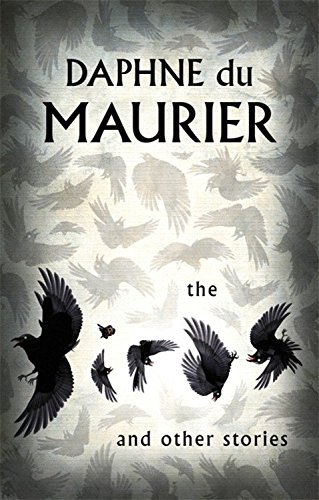
photo © ChrisLloydPhotography, 2011
by Mike Smith
Daphne du Maurier has the reputation of being a writer of unsettling, even scary stories. Hitchcock’s famous horror movie The Birds was based on her short story of the same name, and it’s worth noting that he felt he had to tone down the ending. In the even creepier short story ‘Don’t Look Now‘, a recently bereaved father follows a childlike figure through the back alleyways of Venice, only to find himself confronting a murderous, psychopathic dwarf.
There’s something odd too about ‘The Old Man’, and you don’t have to be expecting oddity to notice it. In the story, the first person narrator responds to a curious holidaymaker who is visiting his part of the coast. The story begins:
Did I hear you asking about the Old Man? I thought so. You’re a newcomer to the district, here on holiday … It’s a lovely spot isn’t it? Quiet and remote. You can’t wonder at the old man choosing to live here.
Hints and clues throughout the story make us as wary of the eponymous hero – the Old Man – just as the narrator is wary, but neither the narrator nor the person who has warned him about ‘the old man’ gives the game away, at least not to begin.
I had the feeling, from the very first, that he had done something, or something had been done to him, that gave him a grudge against the world.
 We keep a safe distance away from the Old Man, along with the narrator, who carries a big stick, just in case. It is easy to believe that the old man is to be avoided, because we mistake what the narrator tells us for something that has actually happened: ‘I had been warned about him … give the old man who lived down by the lake a wide berth.’
We keep a safe distance away from the Old Man, along with the narrator, who carries a big stick, just in case. It is easy to believe that the old man is to be avoided, because we mistake what the narrator tells us for something that has actually happened: ‘I had been warned about him … give the old man who lived down by the lake a wide berth.’
This is a strange place to choose to live – ‘exposed to all the weather’ – and we soon observe the strange behaviour of this seemingly dysfunctional family who are neighbours to the narrator – behaviour that moves through odd, to threatening, to murderous. ‘It’s about the family I really wanted to tell you. Because there was a tragedy, you see.’ That tragedy is the murder of the son by the Old Man, and when we realise this it’s fair to wonder how come the Old Man is still living at liberty by the lake.
By this time, we begin to question some of the oddity in the story. Even the narrator – or at least his guarded response to what we think he is telling us he has seen – appears to be a little odd: ‘I suppose I could have told someone, but … They might have taken the old man away.’
Eventually, we are let in on the secret, and see that we have been misled, perhaps even that we have misled ourselves: ‘…suddenly I saw the old man stretch his neck and beat his wings.’
‘The Old Man’ is a story built upon a simple deception: a metaphor that has been extended as far as a swan’s neck is long. The ‘old man’ is the nickname given to the male swan in a family of swans nesting, quite un-oddly, by the lake, and behaving in a way that, for swans, is not at all dysfunctional. The deception begins with the title itself, and deepens with our introduction to the family: ‘…he was living here beside the lake, along of his missus.’ But the clues are there, in the oddities of the story, its events, and its narration.
 ‘The Old Man’ might be thought to have too much of an O. Henry trick-ending, though the trick here, like many good tricks, has taken place right at the beginning. You might wonder though, once we’ve found out that the old man is a swan, what reason is there to read the story again? Even on a first reading, I confess, I felt cheated, as well as fooled. Yet there was, in that ‘fooling’, some sort of revelation about myself that I had not expected to encounter. C.S.Lewis, in Of Other Worlds, wrote of the ‘surprisingness’ of story – rather than an actual surprise – as being what draws us back for subsequent readings. It’s undoubtedly true, too, that our favourite stories, the ones we read or listen to again and again, are not the ones we have forgotten, but the ones we have not.
‘The Old Man’ might be thought to have too much of an O. Henry trick-ending, though the trick here, like many good tricks, has taken place right at the beginning. You might wonder though, once we’ve found out that the old man is a swan, what reason is there to read the story again? Even on a first reading, I confess, I felt cheated, as well as fooled. Yet there was, in that ‘fooling’, some sort of revelation about myself that I had not expected to encounter. C.S.Lewis, in Of Other Worlds, wrote of the ‘surprisingness’ of story – rather than an actual surprise – as being what draws us back for subsequent readings. It’s undoubtedly true, too, that our favourite stories, the ones we read or listen to again and again, are not the ones we have forgotten, but the ones we have not.
The element we may remember from this story is not that we were tricked by it, but that we were uncomfortable during the reading. We knew that something was not quite right – with the events being described, and with the narrator’s reaction, and actions, in response to them.
I shouted across to the old man, ‘You murderer, you bloody goddamned murderer’. You’ll want to know what I did. I went back and got a spade and I dug a grave…
The weakness of the trick ending might be that, like the one-shot pistol, once it has gone off it cannot be fired again. Yet, on re-reading, the knowledge that we’re being fooled makes us look for the places in which that fooling was taking place – the sentences, the phrases, the individual words: ‘missus’, ‘son’, ‘mother’. Yet words are adroitly avoided. ‘Home’ is used, and it is even described as a ‘Funny sort of lash-up … exposed to all the weather’, but the word ‘house’ is not to be seen.
There was the old man, outside his home, staring down towards his son with murder in his eyes … I bet that old fellow is one hell of a character.
This is a story about how and, perhaps, why we can be, were, and will be fooled, not only in short stories, but in real life. It is a story about language, and how we use it, and how we can misunderstand it. It is a story about contexts, and assumptions, and prejudices; about the very great difference, to which our attention must surely have been drawn, between how we feel about a dysfunctional swan family, and a dysfunctional human one. Now that’s a good reason to read a story for the first, second, and subsequent times.
~
 Mike Smith writes across a range of genres, including poetry, drama, and literary criticism. Under the name Brindley Hallam Dennis he has published That’s What Ya Get! Kowalski’s Assertions (Unbound Press, 2010), the novella A Penny Spitfire (Pewter Rose 2011), and, in 2012, Talking To Owls (Pewter Rose), a collection of short stories, monologues and flash fictions. In 2009, he received the degree of MLitt from Glasgow University. He currently teaches Creative Writing at Cumbria University. His writing has been published, broadcast and performed, and has won prizes and awards in Scotland and England. He is particularly interested in the structure of short stories, and in the relationship between the story and the narrator. He is keen on the ‘told’ story, and some of his tellings can be found at BHDandMe on Vimeo. He has a collection of essays on short story form due out from Pewter Rose Press, and a collection of short stories from Sentinel Publications. He is a founder/presenter of LitCaff, a monthly evening of fiction (with added poetry) in Carlisle, England. His most recent collection of short stories is The Man Who Found A Barrel Full of Beer, written as Brindley Hallam Dennis. His collection of essays on A. E. Coppard, English of the English, features responses to the tales of A. E. Coppard.
Mike Smith writes across a range of genres, including poetry, drama, and literary criticism. Under the name Brindley Hallam Dennis he has published That’s What Ya Get! Kowalski’s Assertions (Unbound Press, 2010), the novella A Penny Spitfire (Pewter Rose 2011), and, in 2012, Talking To Owls (Pewter Rose), a collection of short stories, monologues and flash fictions. In 2009, he received the degree of MLitt from Glasgow University. He currently teaches Creative Writing at Cumbria University. His writing has been published, broadcast and performed, and has won prizes and awards in Scotland and England. He is particularly interested in the structure of short stories, and in the relationship between the story and the narrator. He is keen on the ‘told’ story, and some of his tellings can be found at BHDandMe on Vimeo. He has a collection of essays on short story form due out from Pewter Rose Press, and a collection of short stories from Sentinel Publications. He is a founder/presenter of LitCaff, a monthly evening of fiction (with added poetry) in Carlisle, England. His most recent collection of short stories is The Man Who Found A Barrel Full of Beer, written as Brindley Hallam Dennis. His collection of essays on A. E. Coppard, English of the English, features responses to the tales of A. E. Coppard.

